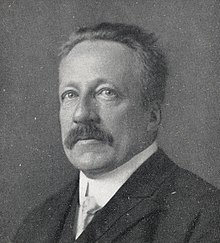Viktor Mataja
Viktor Mataja (born July 20, 1857 in Vienna ; † June 19, 1934 there ) was an Austrian economist and social politician. He was half-brother of the future Austrian Foreign Minister Heinrich Mataja . The writer Emil Marriot (actually Emilie Mataja ) was Viktor Mataja's sister.
After studying law and receiving his doctorate in 1883, Viktor Mataja worked for the Vienna Chamber of Commerce. He made a name for himself as a critic of the civil liability law of the time . He called for a macroeconomic view that should decide where and how liability is applied. He anticipated considerations as developed by Ronald Coase with the economic analysis of law around 1960. Viktor Mataja received university professorships in Innsbruck (1890), Salzburg (1892) and Vienna (1897).
From November 15, 1908 to November 3, 1911 he was entrusted by Emperor Franz Joseph I in the ministries (governments) of Bienerth and Gautsch with the management of the Imperial and Royal Ministry of Commerce (without being appointed Minister of Commerce), as well as by Emperor Karl I. from June 23 to August 30, 1917 in the Seidler Ministry . As a result, he prepared the Ministry of Social Welfare as Minister (without portfolio) on behalf of the Emperor and was appointed Minister of Social Welfare on December 22, 1917. His new ministry began operations on January 1, 1918; he headed it, from July 25, 1918, in the Hussarek Ministry until its removal on October 27, 1918. Mataja is thus the world's first social minister.
Viktor Mataja also made a name for himself as a pioneer in advertising. In 1909 he published his work "Die Reklame", which was considered the standard work of its time. To this day, the Viktor Mataja Medal is awarded as the highest honor for scientists by the Austrian Society for Advertising Science.
In addition to his scientific and political activities, he was President of the Central Statistical Commission from 1914 to 1917 and 1919 to 1922.
Fonts
- The entrepreneurial profit. A contribution to the doctrine of the distribution of goods in economics , 1884.
- The right to compensation from the point of view of economics , 1888.
- The advertisement. A study of advertising and advertising in business , 1910.
- Development of advertising from ancient times to the present. Successful means of business people and ideas advertising from all times and countries , 1926.
- Economic Policy Textbook , 1931.
literature
- Lothar Höbelt : Mataja, Victor. In: New German Biography (NDB). Volume 16, Duncker & Humblot, Berlin 1990, ISBN 3-428-00197-4 , p. 365 ( digitized version ).
- Mataja Viktor. In: Austrian Biographical Lexicon 1815–1950 (ÖBL). Volume 6, Verlag der Österreichischen Akademie der Wissenschaften, Vienna 1975,ISBN 3-7001-0128-7, p. 135.
Web links
- Entry on Viktor Mataja in the Austria Forum (in the AEIOU Austria Lexicon )
- Literature by and about Viktor Mataja in the catalog of the German National Library
- Works by and about Viktor Mataja in the German Digital Library
| personal data | |
|---|---|
| SURNAME | Mataja, Viktor |
| ALTERNATIVE NAMES | Mataja, Victor |
| BRIEF DESCRIPTION | Austrian economist and social politician |
| DATE OF BIRTH | July 20, 1857 |
| PLACE OF BIRTH | Vienna |
| DATE OF DEATH | June 19, 1934 |
| Place of death | Vienna |

